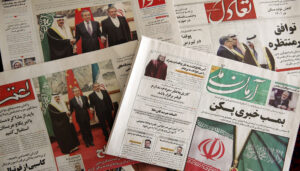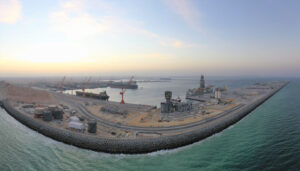By Hani Barghouthi
7iber Recommends is back, and this week’s roundup will focus on the diplomatic and logistical isolation of Qatar that began earlier this week with Saudi Arabia, the UAE, Egypt, and Bahrain, then gained more traction with the involvement of countries like Jordan and others. The situation is extremely complex, and finding a suitable starting point is tricky.
Chronologically, the initial reasoning for this decision was stated as Qatar’s support of organisations considered to be terrorist, as well as Qatar’s stance on Iran. Official outlets announced that Saudi Arabia and the remaining countries considered Qatar’s stance too soft and complacent following comments Qatar’s Emir Tamim allegedly made. This piece in the Washington Post does a good job of analysing the decision to freeze Qatar out, the connection to newly-rejuvenated US-Saudi relations, and the process pursued in implementing this decision.
“The Saudi-Emirati media campaign against Qatar happened to coincide with a high-profile event in Washington, where analysts and former senior U.S. officials cast doubt on Qatar’s reliability as a regional security partner. Ruling circles in Persian Gulf capitals may feel emboldened by the new political climate to see how far they can go in pursuit of hawkish domestic and regional policies and what, if any, pushback they encounter.”
Following initial statements made by the governments of the countries enacting the decision, a new list of demands for Qatar was revealed. This list paints an entirely different narrative from the initial statements’ rhetoric. Speculation began, and has essentially been confirmed, that the main expected outcome of the decision is a media shutdown of several Qatari agencies, especially Al Jazeera, which has long been notoriously critical of Saudi Arabia and the UAE. This is corroborated by Jordan’s involvement in this feud, as Al Jazeera’s permit to operate in Jordan was almost immediately revoked. David Hearst’s op-ed on the Middle East Monitor discusses this issue, along with his stipulation that this campaign is doomed for failure. Hearst’s article is an interesting read, but should be taken with a grain of salt considering its staunchly pro-Qatar stance and occasional oversimplification of the issue.
“This is the media that reveals–in Arabic–the stories that these Arab dictators most want their citizens not to read. Not content with muzzling their own media, they want to shut down all media that reveals the inconvenient truth about their despotic, venal, corrupt regimes, wherever it is in the world.”
In Foreign Policy, Simon Henderson argues that this decision, and the distinct rift in regional and global politics that has ensued, could potentially lead to a substantial war between the different sides. Though strife already existed, things have become increasingly defined and aggressive this past week.
“The nominal target of Saudi Arabia and the UAE is Qatar, which has long diverged from the Arab Gulf consensus over Iran. Riyadh and a growing list of Arab countries broke ties Monday with the gas-rich emirate, and Saudi Arabia announced that it had halted permission for Qatari overflights, closed the land border, and banned ships bound for Qatar transiting its waters. This is a casus belli by almost any definition. For perspective, the Six-Day War, which occurred 50 years ago this week, was prompted by Egypt’s closure of the Straits of Tiran, thus cutting off Israel’s access to the Red Sea.”
The Sunday Times offers a comprehensive overview of how the blockage is affecting Qatar. Read: very little. After the initial panic buying, “the idea of trying to starve a country with the world’s highest per capita income of £101,800 soon turned to amusement.” But although supermarket shelves were replenished and Turkish dairy quickly replaced Saudi products, the report says that the toll on people caught on the wrong side of the border has been significant, citing a Qatari woman who has raised her children alone since divorcing her Bahraini husband and who now risks losing them if they get expelled (as they hold their father’s nationality).
And in addition to the human toll, the crisis poses serious challenges for the west, the report says.
““This is the proverbial hole in the head,” said a western diplomat. Qatar is critical to the West’s biggest continuing military campaigns, hosting the al-Udeid airbase, where 10,000 US forces are stationed along with about 100 RAF and more than 100 warplanes and drones. Sorties leave daily to carry out airstrikes in Afghanistan to help drive Isis from Iraq and Syria. It was from here the Moab — America’s mother of all bombs — was despatched to blow up an Isis base in southeast Afghanistan in April.”
Meanwhile, Robin Wright discusses Donald Trump’s role in this situation specifically, and with GCC countries generally, in the New Yorker. In a concise and insightful piece, she stipulates that his recklessness in responding to the crisis may signal an end to his newly-established alliance with Qatar.
“‘During my recent trip to the Middle East I stated that there can no longer be funding of Radical Ideology. Leaders pointed to Qatar – look!’ the President tweeted after the Saudi announcement. He not only took sides in an intra-Arab dispute; he sabotaged the cohesion of his own new Sunni coalition—which he touted just last month as an unprecedented foreign-policy success.”












